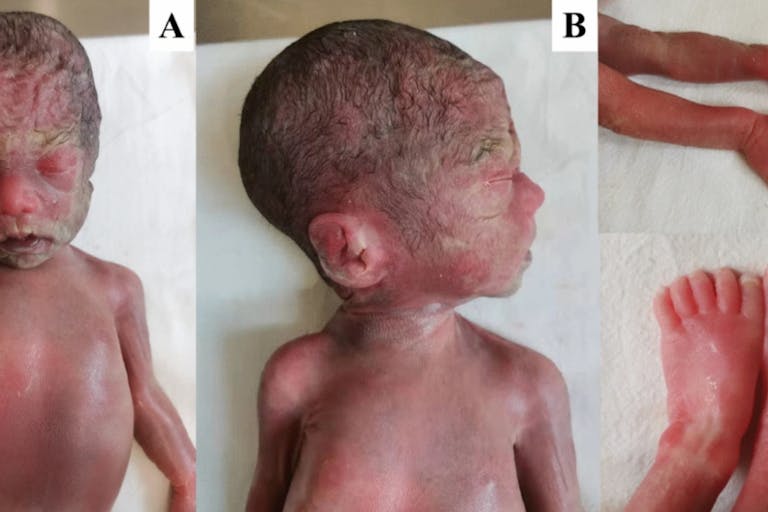
Study reveals heartbreaking images of baby girl aborted at 26 weeks
Nancy Flanders
·
Human Interest·By Nancy Flanders
Baby becomes first at UNC to receive life-changing gene therapy
A baby boy in North Carolina has become the first patient in the state with spinal muscular atrophy (SMA) to receive life-changing gene therapy after his mother enrolled him in a pilot study that tested him for the condition.
The couple, who chose to remain anonymous, went through a difficult diagnosis with their first child at birth. Though the pregnancy with their second child was uncomplicated, they still worried about his health. When he was born seemingly healthy in February 2021, the parents receive a letter in the mail regarding Early Check, a pilot study focused on screening newborns for rare health conditions. At the time, North Carolina was one of several states that did not check for SMA as a part of routine newborn screening, so his parents decided to enroll him in the study.
Early Check is a collaboration between RTI International, North Carolina State Laboratory of Public Health, and three universities — the University of North Carolina at Chapel Hill, Duke University, and Wake Forest University. Early Check tested babies both prenatally and postnatally for rare conditions including SMA beginning from October 2018 through the spring of 2021.
“With Early Check, we started including SMA because it wasn’t a part of the general newborn screening for the state, so it was a pilot to see how it could work and to see if we could identify this condition in newborns,” said Cynthia Powell, MD, pediatric geneticist and UNC site principal investigator for Early Check.
The baby boy was enrolled in the study when he was about three weeks old. Four days later, his parents received a phone call that changed everything.
READ: SHOCK: Ireland abortionists admit a ‘fatal’ prenatal diagnosis may not be ‘certain’
“It was one of those really nice spring days, a Friday afternoon. We were out getting ice cream and when we got back in the car, we both had missed calls,” said the boy’s mother. “After listening to the voicemail, my stomach dropped.”
Article continues below
Dear Reader,
In 2026, Live Action is heading straight where the battle is fiercest: college campuses.
We have a bold initiative to establish 100 Live Action campus chapters within the next year, and your partnership will make it a success!
Your support today will help train and equip young leaders, bring Live Action’s educational content into academic environments, host on-campus events and debates, and empower students to challenge the pro-abortion status quo with truth and compassion.
Invest in pro-life grassroots outreach and cultural formation with your DOUBLED year-end gift!
Their son had received an abnormal newborn screen result for SMA, a rare condition in which the survival motor neuron protein (SMN1) is missing. It causes irreversible loss of cells in the spinal cord and brain stem that leads to progressive deterioration of the muscles. There are three types of SMA and most children with the condition will lose mobility and muscle strength within the first six months after birth. The condition, if untreated, can cause death by age two or three.
The couple was at first understandably distraught, but then learned that treatments are available. They had a choice of either Spinraza — a drug that costs $125,000 per dose and is taken every four months throughout the patient’s life — or Zolgensma, a $2 million one-time treatment that must be taken before SMA robs the baby of his motor abilities. The couple chose Zolgensma, which is a gene therapy that must be taken before age two and which involves delivering a safe virus, AAV9, carrying a fully functional SMN1 gene to the motor neurons. It improves muscle function, movement, quality of life, and length of life.
“I have a real appreciation for our doctors,” said the boy’s mother. “They are so brilliant and they want to use that towards the good of our children. There’s hope.” Her son is expected to have normal development.
Beginning on May 1, 2021, North Carolina added SMA to its routine newborn screening. Prenatal screening also exists to test babies prior to birth for SMA, as was the case for Lexa Dennis, who was diagnosed prior to birth with SMA. Her older brother Axel was not diagnosed until he was five weeks old and had already begun to lose some of his motor function. Because the parents knew that Lexa had a 25% chance of having SMA as well, they opted for prenatal screening in order to ensure she received treatment as soon as possible after birth.
Children with SMA can live normal lives thanks to new treatments that exist because doctors and parents were willing to fight for them. Aborting due to a prenatal diagnosis is an injustice that prevents doctors from developing treatments that can lead to improved quality and quantity of life outcomes.
“Like” Live Action News on Facebook for more pro-life news and commentary!
Live Action News is pro-life news and commentary from a pro-life perspective.
Contact editor@liveaction.org for questions, corrections, or if you are seeking permission to reprint any Live Action News content.
Guest Articles: To submit a guest article to Live Action News, email editor@liveaction.org with an attached Word document of 800-1000 words. Please also attach any photos relevant to your submission if applicable. If your submission is accepted for publication, you will be notified within three weeks. Guest articles are not compensated (see our Open License Agreement). Thank you for your interest in Live Action News!

Nancy Flanders
·
Human Interest
Angeline Tan
·
Human Interest
Bridget Sielicki
·
Human Interest
Nancy Flanders
·
Human Interest
Nancy Flanders
·
Human Interest
Nancy Flanders
·
Issues
Nancy Flanders
·
Human Interest
Nancy Flanders
·
Investigative
Nancy Flanders
·
Pop Culture
Nancy Flanders
·
Human Interest
Nancy Flanders
·